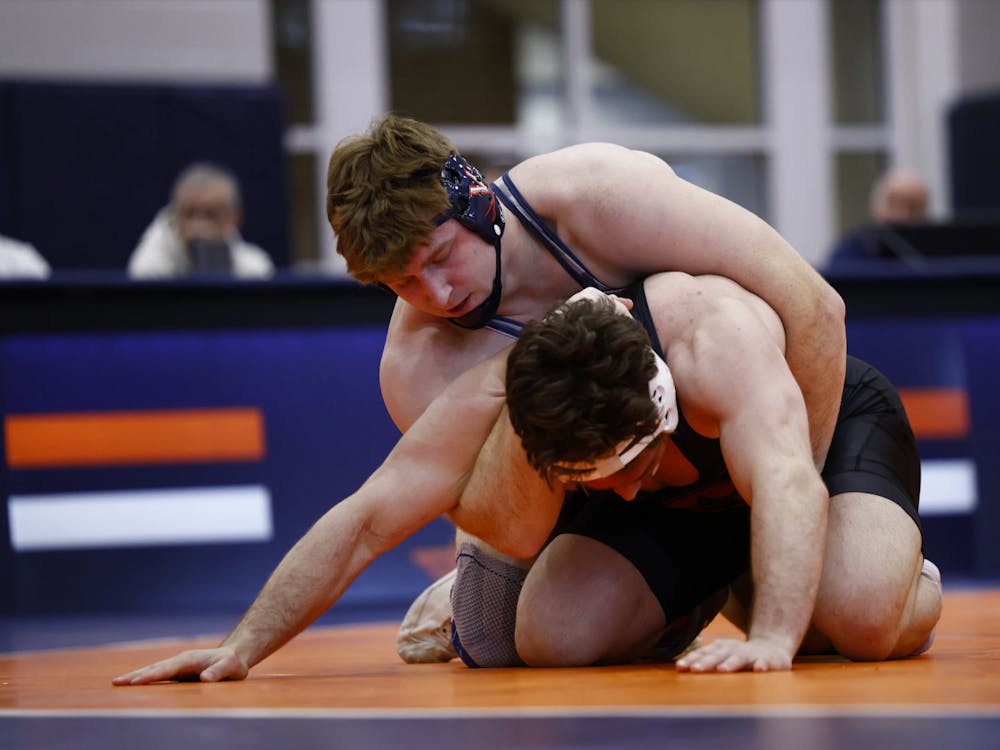As the University community has unfortunately been forced to witness first hand recently, the issue of race still pervades much of American society. Whether it's a debate over affirmative action, the death penalty, rap music or welfare policy (just to name a few), the subject of race and race relations takes on a key role.
As is traditionally the case, the world of sports is not immune to such societal issues or ills. The issue of race has both overt and subtle influences on the world of sports.
The most overt topic surrounding race relations is the lack of minority coaches, general managers and owners in every major sports league. In an attempt to deal with this glaring deficiency, the NFL has adopted a new, controversial policy requiring every team to interview at least one minority candidate when searching for a new head coach.
Although former Washington and Baltimore defensive coordinator Marvin Lewis was able to land a job in the black hole that is Cincinnati (the only African-American hired this off-season despite five vacancies), black coaches such as former Vikings headman Dennis Green and current Jets defensive coordinator Ted Cottrel were left in the proverbial cold once again. Why? Well, according to San Francisco's Bill Walsh and Terry Donahue, the 49ers hired Oregon State coach Dennis Erickson (who posted a less-than-impressive 31-33 record during his four-year stint with the Seahawks) because he had NFL head coaching experience.
But such justification begs the question: If African-American coaches are not hired because they lack "NFL head coaching experience," how are they ever going to get that elusive "experience" when no team is willing to give them a chance to become a head coach in the first place? I think you see the catch-22 dilemma facing the NFL and its hiring policy.
Superstars such as Tiger Woods in golf, the Williams sisters -- Venus and Serena -- in tennis, and Jarome Iginla in the NHL have taken sports traditionally dominated by white athletes by storm not only with their superior play but also because they are minorities. Woods' effect on golf and minorities has been well-documented. The same can be said for the Williams sisters. For those of you who don't know Iginila, he is currently 11th in goals scored in the NHL -- a league in which black players constitute fewer than 5 percent of all roster spots.
It must be pointed out, however, that these athletes are usually referred to within the context of them being a minority rather than simply them being superstars in their respective professions. Our lenses, sadly enough, are not colorblind.
The same is true on a subtler and possibly even subconscious level. Why is it that African-American athletes more often are referred to as "natural athletes" and white players are more often described by their "headiness" or as being "fundamentally sound"? Why is it that a white athlete is more likely to be referred to as a "gym rat" than his African-American counterpart?
Many complain, and deservedly so, that simply labeling someone (black or white) as a natural athlete ignores the amount of hard work, dedication and training -- both mentally and physically -- that such gifted athletes put into their craft in order to maximize their "natural" potential.
The same sort of thinking enters American sports in other ways. For a long time, many people believed that African-Americans could not play quarterback, middle linebacker or point guard. For that matter, many people still believe that white athletes cannot play cornerback in the NFL.
When Eagles quarterback Donovan McNabb established himself as a Pro Bowl signal caller, many analysts referred to him as the next Randall Cunningham for his ability to scramble out of the pocket and use his mobility to create plays. But why didn't those same analysts refer to McNabb as the next Steve Young -- a closer match to McNabb's playmaking capabilities and overall superior skill level? Was it because Cunningham was African-American and Young was not? McNabb's case is just one example of scores of possible ones I could have presented.
When former NBA All-Star Charles Barkley made the statement that if Larry Bird was black then he would have just been considered another good player, many people got upset at such a notion. Now even though Barkley later rescinded his comment, his underlying point may not have been that farfetched.
Hopefully these examples will serve as some food for thought about topics that usually are not even considered by the dedicated sports fanatics and casual fans, alike. I do hope that this serves to remind people that we still have a long way to go before our lenses will be colorblind and, for the lack of a better phrase, we will no longer see "in terms of black and white."






